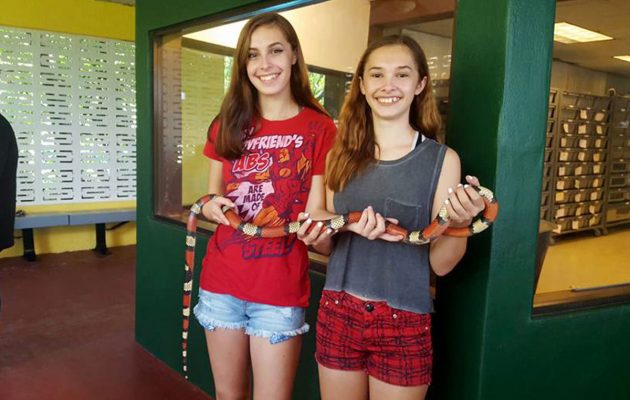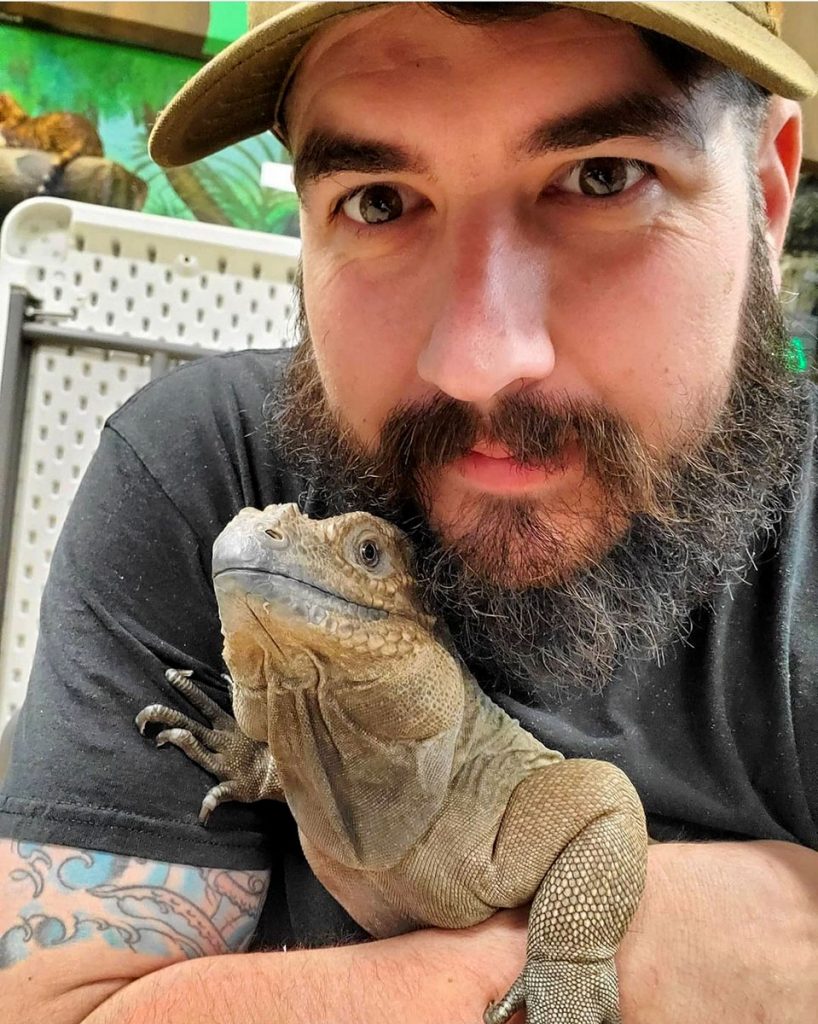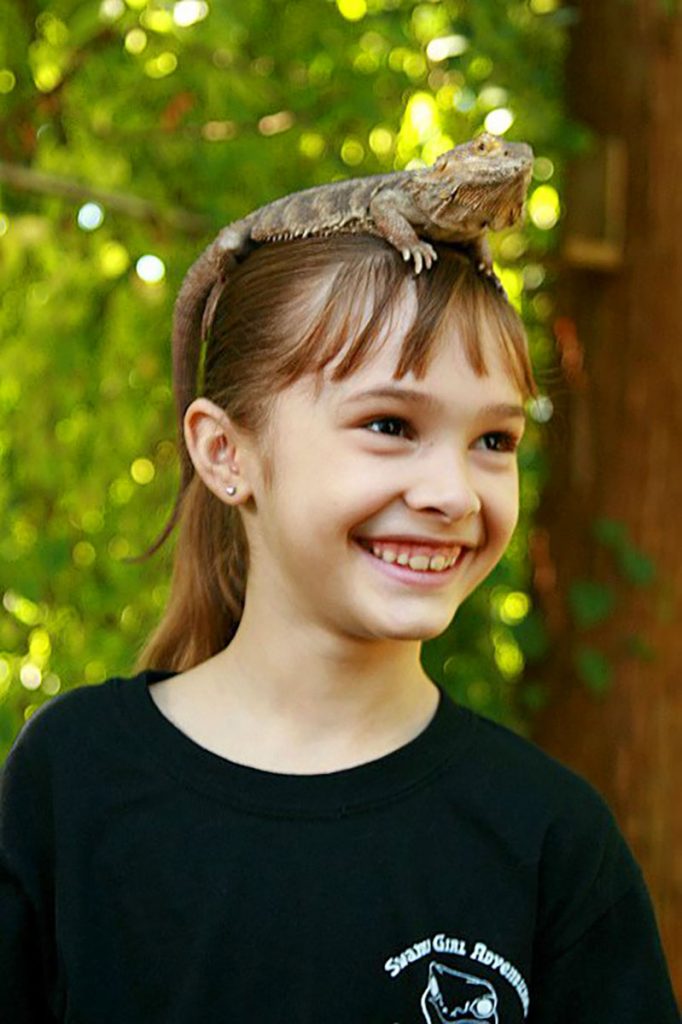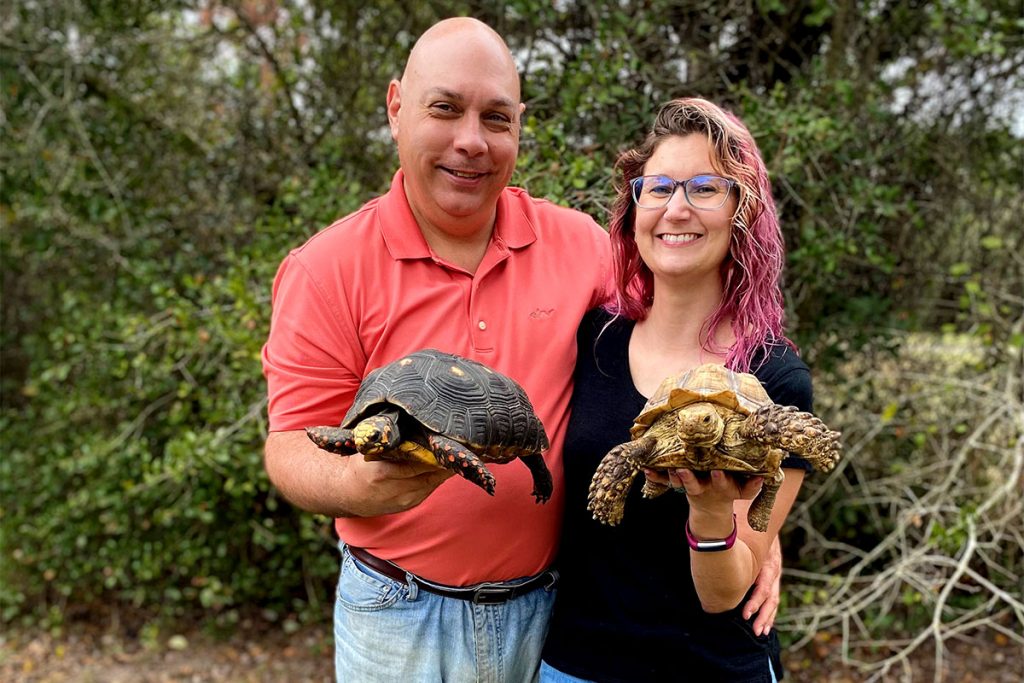Pet reptiles & amphibians: Instant Wow factor

They may not be furry or cuddly, but legal pet herptiles (reptiles and amphibians), are fascinating pets. They have unique skin, scales or shells, odd physical features, unexpected colors and mesmerizing behavior. Their striking appearance or almost-alien, “wow factor”, immediately attracts attention. They include common pet reptiles like lizards, snakes, turtles or tortoises, and amphibian frogs, toads, newts and salamanders, among many others.
Reptiles are cold-blooded, air-breathing vertebrates (possess a backbone), that move on their bellies or small, short legs and are usually covered with scales or bony plates. These egg-layers are classified as part of the dinosaur family and include some of the most ancient animal species alive on Earth.
Amphibians are also cold-blooded vertebrate animals, but most have moist, smooth skin. They are distinguished by an aquatic, gill-breathing, larval stage, followed by a lung-breathing stage on land. They lay shell-less eggs in water or wet areas, and resemble an animal somewhere between fish and reptiles.
Despite the description of a “reptilian brain”, limited to a primitive drive that controls bodily functions, continuing research shows that some herptiles can learn, be trained and adapt to environments. They dwell on dry land, in water or both. Depending upon age and species, they are carnivores, herbivores, insectivores or some combination during their lifetimes.

Shane Smith works fulltime in a Jacksonville pet shop and specializes in herps. His childhood hobby catching frogs and toads led to his first pet snake at age ten. Formerly active-duty coast guard, now a reservist, Smith will soon complete an environmental sciences degree, intent on a wildlife biology career. A former member of the Milwaukee Area Herpetological Society, among the largest in the U.S., Smith raised funds for herp conservation, rescue and educational outreach.
At the pet shop, Smith loves talking to children and answering questions about herps and the environment. Smith said it is crucial to educate children about animals, wildlife and the environment, so they will become knowledgeable adults, who understand and care about conservation and the need to protect all species and habitat.
Smith’s unusually-broad perspective on herptiles is not only as a longtime herp owner, and pet shop staff, but also as a former employee of a major venom collection lab. Only a few labs worldwide extract poisonous venom from the venom glands of snakes for use in scientific, medical and antivenom research, and for manufacture of medications and antivenom.
“All snakes, captive-bred legal pets or native wild snakes, especially venomous snakes, suffer the consequences of widespread myths and misconceptions. They are too often labeled as bad animals that should be killed. Most people don’t know that snake venom is used for research by toxicologists and pharmaceutical companies to create life-saving medications, including antivenom for snake bites in humans or animals. Venom components are used in medications for treatment of strokes, heart conditions, brain injury, hypertension, blood disorders, Alzheimer’s disease and other ailments,” he said.
Chuck Smith, president of the Jacksonville Herpetological Society, moved to Florida forty-five years ago specifically because of his serious pet herptile hobby. He said that Northeast Florida has the ideal climate for keeping pet turtles, frogs, snakes and lizards indoors, seasonally outdoors or in outdoor climate-controlled enclosures.
“Herptile pets require time, alot of care and education about various species. I’ve been a herp owner and active herpetological society member for decades. The strongest message I have is to discourage people from taking reptiles and amphibians out of the wild, even species that are legal to possess in Florida,” he said. “Learn as much as possible about any reptile or amphibian before you purchase that animal and only purchase or adopt from a reputable, licensed pet store, breeder or rescue organization. Ask questions. Verify that the herptile is legally bred and born in captivity and not removed from the wild, including eggs.” When Smith isn’t tending to his extensive herp family, he is an indoor tropical plant expert who works for a local plant nursery. President of the Jacksonville Herpetological Society, he presents educational programs to community groups and homeowner associations.
Cayle Pearson, Jacksonville Zoo Assistant Curator of Herps, Birds & Others, planned to attend veterinary school until he went to work in a pet shop, where he immediately “was hooked” on the reptiles. He said that when handling herptiles, strict cleanliness, sanitization and hand-washing are necessary to avoid any possibility of bacterial infection or diseases that can be transmitted to humans. Anyone with an open wound should never handle herptiles; never eat or drink around them.
Pearson cares for the zoo’s herptiles and birds, and is part of multiple conservation projects to save endangered herps and the habitats they require to survive. Pearson noted persistent public misunderstanding about the value of all herp species.

“Every animal plays a vital role in the ecosystem. If we lose even one, their predators are affected and that ripples down, adversely impacting the food chain,” he said. “Herptiles, birds, bats, snakes, all provide pest, insect and rodent control. Beneficial resident snakes, like black racers, king and rat snakes routinely prey upon or prevent venomous snakes from moving in.”
Pearson said most people falsely believe that common Florida animals like snakes and alligators are prone to bite or attack by nature. In most interactions, however, unless cornered or threatened, they usually flee or freeze, and desperately try to completely avoid humans. Alligators that have been fed, however, lose their fear of humans and behave aggressively in constant search of more food. In all cases, widely avoid, never approach and keep children and pets safely away from snakes or alligators.
Herptile experts note it is imperative to learn as much as possible about any herptile pet before purchase, especially the expected adult size, age expectancy (varies greatly, but can range from 3 – 50+ years), lifetime housing and dietary requirements. Young,small herptiles may rapidly outgrow typical pet store tanks. Cold-blooded herptiles require strictly controlled environmental conditions to maintain body temperature through external sources. Unable to pant, shiver or sweat to increase or reduce body temperature, herptiles must move to find their optimal temperature. Learn before purchase, which herptiles are best for a first-time owner.
Besides constant temperature control, herptiles need special lighting, humidity, misting, water, hiding and basking spots. Their diets are diverse and species-specific. Habitat requirements differ; some prefer flat spaces with hiding places, while others climb horizontally. Secure, escape-proof housing is essential, as is protection from other pets, children or predators if housed outdoors.
Although herptiles may not require the same daily care or exercise of other pets, they cannot survive neglect. It is also important to understand that herptiles may prefer never to be handled, might routinely hide or become stressed with human contact, including normal household noise and activity.
If a herptile or other nonnative pet owner can no longer care for or no longer wants their exotic pet, or if they possess an illegal exotic, nonnative or wildlife animal, the Florida Fish & Wildlife Conservation Commission (FWC), holds periodic Exotic Pet Amnesty Day events throughout Florida. Individuals can surrender exotic or illegal animals free of charge, with no penalties or prosecution, to authorities.
The goal of these amnesty events is to prevent release of exotics, invasive (nonnative) or illegally-held animals into the wild. Most exotics, and any animal housed and fed as a pet, usually cannot survive in the wild. If they do survive and breed, or prey on native animals and birds, they threaten survival of those native animals, the stability of the ecosystem and may pose risks to humans. Release of exotics or nonnative animals is illegal and unethical.
National Gopher Tortoise Day, April 10, 2021, promotes awareness and protection of a reptile keystone species, the gopher tortoise – federally protected under the Endangered Species Act. A keystone species is a critically important wild animal that other species depend upon for survival. Their elimination would drastically and negatively impact the ecosystem. Gopher tortoise burrows are twenty-five feet deep and provide shelter to approximately 350 other species.

Fortunately, Danielle D’Amato, local founder of SCUTES (Sustainable Care & Urgent Treatment for Every Shell), is an FWC licensed wildlife rehabilitator who can legally rehabilitate injured or ill turtles. She has created a Go Fund Me site to purchase acreage for a gopher tortoise refuge in Northeast Florida. D’Amato is a herpetologist, marine and wildlife biologist, who works for the U.S. Army Corps of Engineers. She and her husband and co-wildlife-rescuer, Pete Bis, are US. Navy veterans. She presents educational programs to the community regarding gopher tortoises, diverse wildlife and conservation issues.
By Julie Kerns Garmendia
Resident Community News






